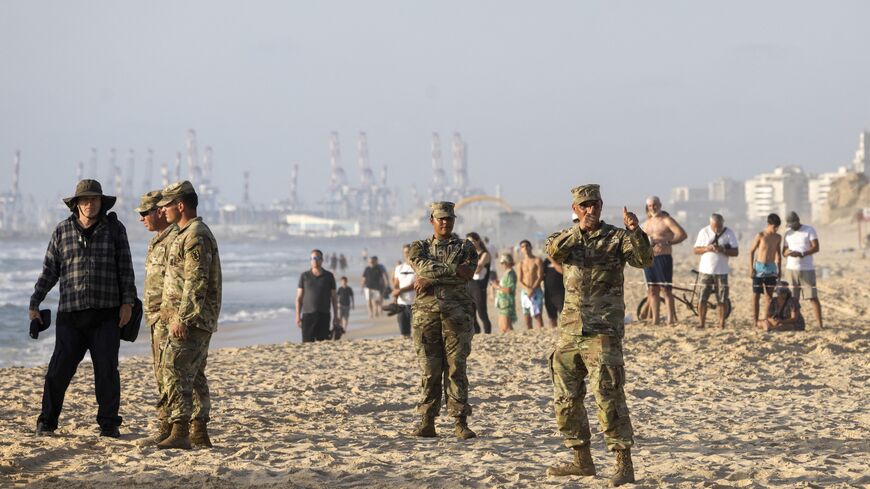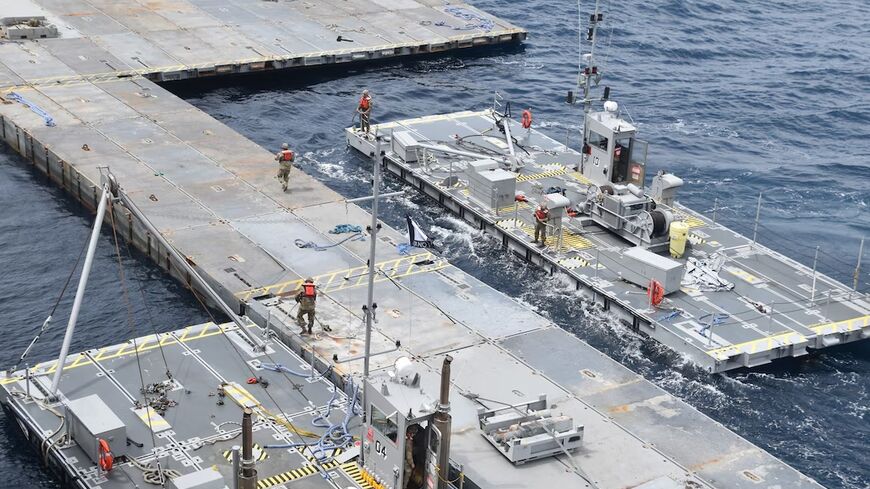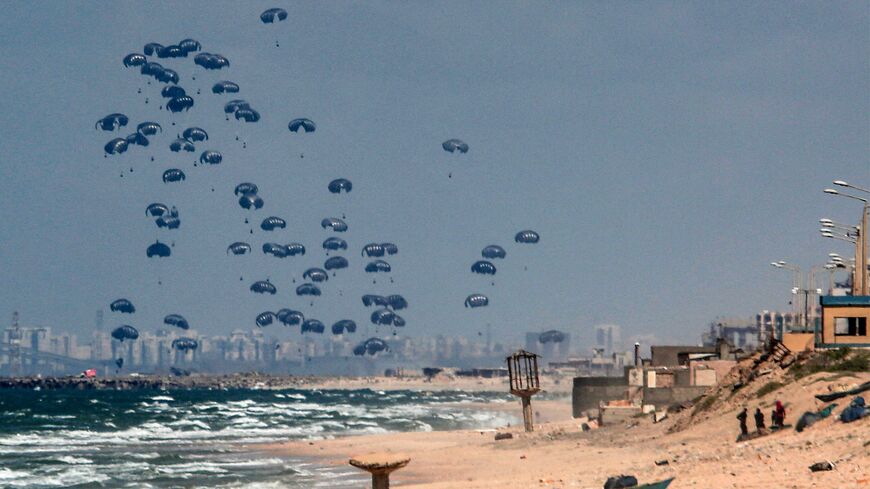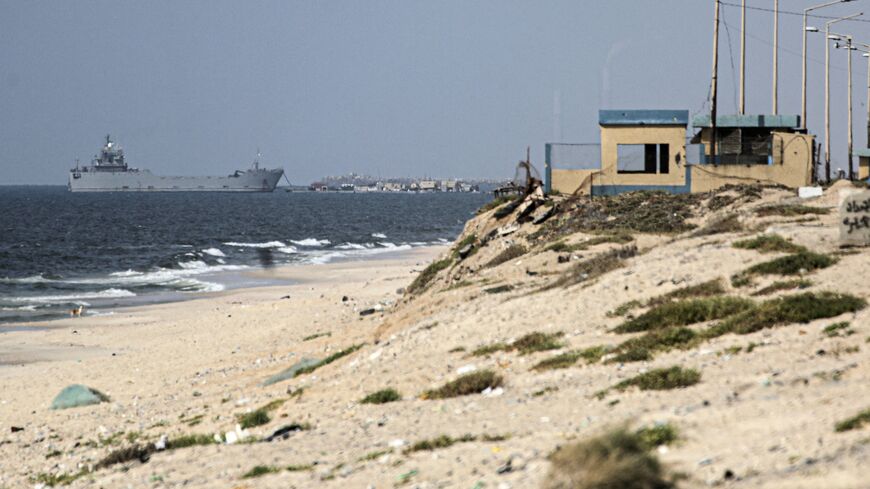Gaza aid pier breaks down, halting US humanitarian deliveries by sea
The Biden administration's plan to alleviate famine in the Palestinian enclave — and in turn, enable Israel to pursue what remains of Hamas — is falling apart.
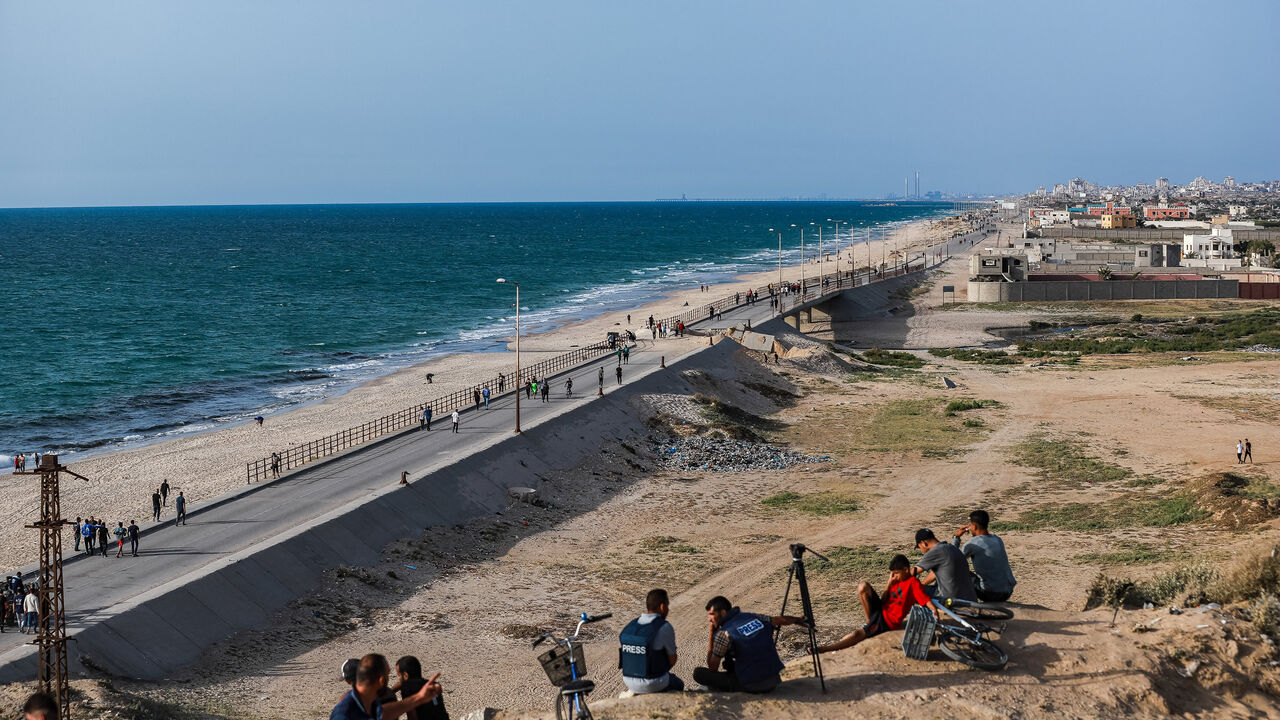
WASHINGTON — The US military has halted deliveries of humanitarian aid to the coast of the Gaza Strip after a temporary floating pier suffered significant damage due to bad weather and high tides, Pentagon officials said Tuesday.
Part of the causeway system that had been anchored into the shore came unmoored, and will be towed by US forces to the Israeli port of Ashdod for reconstruction, deputy spokesperson Sabrina Singh told reporters.
The repair and re-anchoring of the pier onto the Gaza coast is expected to take “at least over a week,” Singh said.
How it happened: US Central Command said on Saturday that "heavy sea states" had washed four US Army vessels supporting the pier operation ashore, but that the pier itself remained "fully functional."
"The vessels broke free from their moorings and two vessels are now anchored on the beach near the pier. The third and fourth vessels are beached on the coast of Israel near Ashkelon. Efforts to recover the vessels are under way with assistance from the Israeli Navy," CENTCOM's statement read.
One of those vessels has since been recovered. One of the ships beached near Ashdod and is expected to be recovered in the next 24 hours, Singh told reporters, while the other two beached near the pier are expected to be recovered in the next 48 hours with the assistance of the Israeli Navy.
By Tuesday, a section of the pier had become dislodged “due to high sea states and a North African weather system,” she said.
“As a result, the Trident pier was damaged and sections of the pier need rebuilding and repairing.”
Why it matters: The incident deals a significant blow to the Biden administration’s plan to rely on the military to help surge humanitarian aid into Gaza in order to avert famine while Israel continues its war against Hamas.
US military vessels began ferrying international aid to the pier on May 17 after more than a week of delays, which US officials attributed to high sea swells.
Pentagon officials downplayed the breakdown in the pier operation on Tuesday, emphasizing that more than a million pounds of humanitarian aid had already been brought ashore since last week.
But initial deliveries fell short of expectations.
USAID, the US agency coordinating the aid delivery along with the UN’s World Food Programme, initially estimated the pier would enable the delivery of some 290 metric tons of humanitarian aid per day before logistics were fully up and running, eventually reaching some 430 to 750 metric tons per day, Al-Monitor previously reported.
The UN paused distribution for at least two days last week after people overran a number of aid trucks which had departed the onshore distribution facility controlled by the Israeli military.
Northern Gaza is facing “full-blown famine,” the head of the WFP said on May 6, though experts say the effects are likely spread throughout the Palestinian enclave.
Biden administration officials have repeatedly pressed Israeli leaders, and more recently Egyptian officials, to ensure the flow of cross-border humanitarian aid into Gaza, saying the pier is meant to augment, not replace, the overland shipment of humanitarian aid.
The context: US President Joe Biden has resisted calls to directly pressure Israeli leaders to halt the war, instead pushing for renewed rounds of cease-fire to persuade Hamas to release the hostages and Israeli leaders to pause their campaign.
Biden ordered the US military in March to construct the pier on Gaza’s coast in order to surge international humanitarian aid into the Palestinian enclave.
Pentagon deputy spokesperson Singh on Tuesday said the cost estimate for the pier operation remains at “roughly $300 million,” despite the recovery effort.
Know More: US pressure has failed to prevent an Israeli military invasion of Rafah, despite Biden saying in March that this would be a “red line” for his administration.
IDF tanks were spotted near the al-Awda mosque in the center of Rafah city on Tuesday, in a further sign Israel is defying an order issued on Friday by the UN’s International Court of Justice to halt the operation.
Yet both the Pentagon and the White House said they don’t assess Israeli forces to have launched the sort of major incursion that they say would violate Biden’s red line.
“Lots of units, tens of thousands of troops, or thousands of troops moving in a coordinated set of maneuvers against a wide variety of targets on the ground in a massive way – that’s a major ground operation,” National Security Council spokesperson John Kirby told reporters from the White House’s press briefing room on Tuesday.
US officials have dismissed the ICJ’s orders as baseless, alleging the court does not have jurisdiction in the Palestinian territory. The court assessed in 2021 that it does have jurisdiction in the territories for activities by both Israeli and Palestinian nationals, a conclusion welcomed by Palestinian officials.
The Biden administration withheld a single shipment of 2,000-pound and 500-pound air-to-ground munitions to Israel last month, a symbolic gesture amid continued US approvals for future arms transfers.
“Security assistance continues to flow,” Singh told reporters on Tuesday.
The White House previously signaled that additional arms shipments would be withheld if Israel launched a major operation into Rafah’s population centers.
An Israeli air strike on Saturday killed at least 37 people in a crowded area where displaced Gazans had sheltered near a safe zone designated by the Israeli military.
The IDF said it has opened an investigation into the strike in Tel al-Sultan, which the IDF said killed two Hamas militants. Spokesperson Adm. Daniel Hagari said the munition used in the strike contained a 17-kg (37-lb.) warhead, implying it was too small to have caused the fire that spread throughout the encampment.
Kirby said there had been no change to US arms transfers policies to Israel, despite the strike on civilians, and deferred to the Israeli military’s investigation.
Asked whether additional Israeli airstrikes on civilians in Rafah would constitute a major military operation, Kirby said, “It would have to depend on the size and scale and scope,” after noting earlier in the briefing that there was “not like a measuring stick here, or a quota.”
The Israeli military began encircling Rafah in early May. More than a million people have fled the southern Gaza enclave since, the UN’s agency for Palestinian refugees said Monday.
The US believes hundreds of thousands of other civilians remain in Rafah, based on estimates by the IDF and international organizations, Kirby said on Tuesday.
European Union officials have begun discussing possible sanctions against Israel if it defies the ICJ’s order to halt the operation in Rafah, Ireland’s Foreign Minister Micheál Martin told reporters in Brussels on Monday.
Kirby on Tuesday didn’t respond directly when asked whether there were concerns within the administration that the US and Israel were facing increasing international isolation over the war in Gaza.
“The president doesn’t make decisions and he doesn’t execute on policy, based on public opinion, polling, or on popularity contests,” he said, adding, “He bases his decisions on our own national security interests.”



